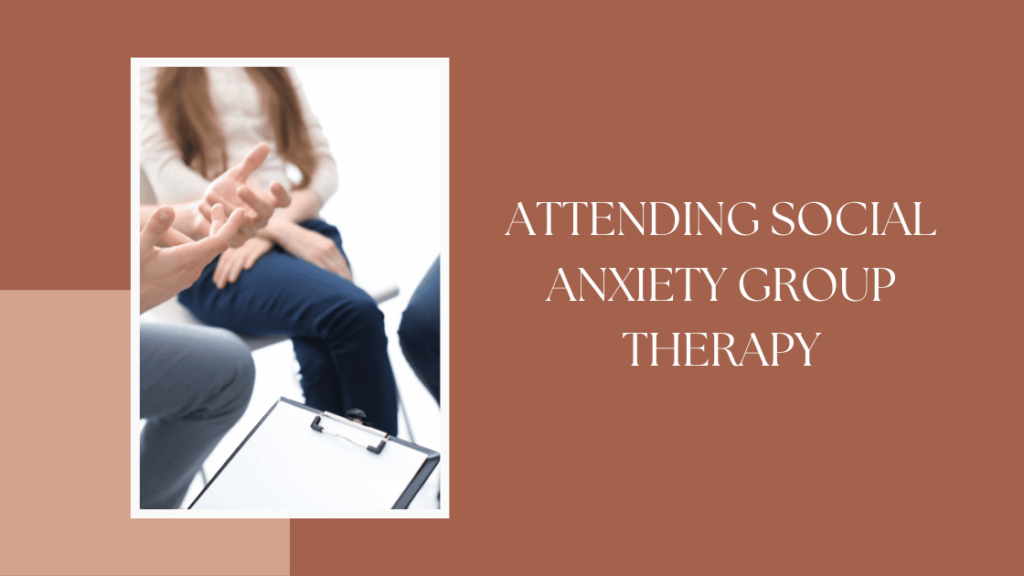Social anxiety disorder is a fairly common type of anxiety. We sometimes call it a social phobia, and the key symptom is a sense of extreme fear in various social situations.
If someone has social anxiety, they may have trouble attending social gatherings or meeting new people. The fears that accompany this mental health condition can make social anxiety group therapy seem like a counterintuitive treatment option.
You might wonder why, if you have social anxiety, you would want to share in front of a group setting. The reality is that social anxiety group therapy and social anxiety help groups are a good way to begin working through your phobias and developing new coping social skills.
Understanding Social Anxiety Disorder
Social anxiety disorder isn’t the same as being shy or nervous around new people. The big difference is that having a mental health disorder like social phobia impacts your functionality in your daily life. There are a variety of anxiety disorders, all of which impact how you function when they’re untreated.
- For a social phobia or anxiety disorder diagnosis, you would be feeling this way for at least six months.
- What you’re feeling makes it hard to do everyday tasks, like going to school or work.
- The disorder includes symptoms like a persistent, intense fear of people watching and judging you. You may have a hard time forming friendships because of it. Simple things can turn into a highly triggering or stressful situation.
- Doing everyday things like talking to a cashier in a store, answering a question in front of people, attending business meetings, or even using public restrooms can cause you to feel extreme fear or anxiety.
- The fear that often underlies this psychiatric disorder is so intense that you’ll feel it’s out of your control. You’ll avoid doing things in your everyday life, or if you can manage them, you may have a tremendous amount of anxiety or fear.
- You could fear a social situation weeks before it happens. You might avoid any events or places that make you feel stressed or embarrassed.
For many people, the signs and symptoms of social anxiety disorder will begin during late childhood. They can initially seem like extreme shyness, and it’s more common in females than males.
Social anxiety symptoms include:
- Trembling, blushing, or sweating
- Rapid heartbeat
- Feeling your mind going blank
- Feeling sick to your stomach
- Rigid body posture
- Speaking in an overly soft tone
- Unable to make eye contact
- Self-consciousness
- Avoidance of places with other people
- Trying to blend into the background if you have to attend an event
- Needing alcohol to be in a social situation
The anxiety you feel may not occur in every situation. Some people only have it in particular scenarios, or you may have performance anxiety.
At least some of the risk for developing this disorder is genetic. It often runs in the family, and researchers have discovered that parts of the brain involve fear and are affected. Genetics influence the function of these brain areas.
Stress and environment can also play a role, common in all mental disorders. There’s usually not one reason we can point to why some people have these disorders and others don’t.
Anxiety disorders can occur with depressive symptoms and signs of other mental disorders.
Treating Social Anxiety Disorder
When a social phobia goes undiagnosed or untreated, it can last a lifetime. Over time, it can lead to serious complications and diminished quality of life. Treatments are available, though, and they tend to be highly effective when people seek them out.
Medication
Social anxiety can be severe and ongoing. As a result, a mental health professional might prescribe medicines that will help lessen the symptoms.
Selective serotonin reuptake inhibitors (SSRIs) tend to be a first-line effective treatment. Medicines include Paxil and Zoloft, and they work by increasing the amount of serotonin in your brain. Serotonin is a neurotransmitter, and low levels are associated with anxiety and depression.
Serotonin-norepinephrine reuptake inhibitors (SNRIs) are another class of antidepressant that is also used to treat anxiety. Cymbalta and Effexor are SNRIs. These medicines change the signals in your brain to improve anxiety and mood.
Beta-blockers are a type of medicine for high blood pressure. Still, off-label, they may help the physical symptoms of anxiety people experience, like tremors, sweating, and rapid heart rate.
Short-term anti-anxiety medicines can be habit-forming, so they’re used less often. These include Xanax and Klonopin.
Therapy
Therapy, whether used with medication or on its own, can be excellent for social interactions. Therapy allows you to talk about thoughts and feelings and then uncover the root cause of your anxiety. When you participate in therapy, you can create a plan to overcome what you’re experiencing and develop new skills to deal with triggers.
- During psychological treatment, you can also create healthy habits to deal with your disorder.
- Psychotherapy is also known as talk therapy.
- You work with your therapist to learn to change negative thought patterns about yourself.
- You might also engage in role-playing and other methods to build your confidence.
- Individual therapy is when you work one-on-one with your mental health provider or counselor, and there are other options available too for people with anxiety.
- Online therapy may be an option if you aren’t ready to go in person or can’t find a provider near you who provides the mental health services you need.
The Benefits of Social Anxiety Group Therapy
Social anxiety group meetings can be beneficial for almost everyone who experiences anxiety. In particular, you might consider cognitive-behavioral group therapy.
- Benefits of cognitive-behavioral group therapy include being around people who share similar symptoms to your own. You realize you aren’t alone. That in and of itself is helpful.
- What’s also good about social anxiety group therapy is that you’re getting exposure therapy at the same time. You’re in a safe environment, but you have to talk to other people and share in front of the group members. You’re doing so to help you feel more comfortable, though, and then you can take the skills you learn and apply them to your daily life outside of therapy.
- When you’re in a social anxiety therapy group situation, there are good opportunities for role-playing so you can build confidence.
If you’re interested in social anxiety help groups, talk to a mental health professional. They can point you in the right direction.
When choosing this treatment format, you want to ensure it only includes people with social phobia because the treatment approach is unique and different even from other anxiety disorders.
- An ideal group might have no more than six people and should be therapist-led.
- The person leading the sessions should have a deep knowledge of the disorder and how to deliver group cognitive-behavioral therapy.
- While it can vary, many treatment programs include 12 to 24 sessions. Group therapy will focus on exposure in sessions, cognitive restructuring, and homework assignments.
Exposure disrupts your anxiety cycle by letting you stay in a situation you fear long enough to feel a natural reduction in your anxiety. Cognitive restructuring is when you evaluate and test your dysfunctional thoughts and beliefs.
In your homework for cognitive-behavioral group therapy, you might be asked to engage in real-life situations that simulate what you did in the group.
While group therapy tends to work best in person, you could find online meetings and online discussion forums that are helpful to you and help you feel less alone as well. You can build a community of people with experiences similar to your own.
Social Anxiety Group Therapy in San Diego, CA
The hope is that with appropriate treatment, you can change your core beliefs and challenge your dysfunctional beliefs, feel fewer symptoms, have a better social life, and engage in more social activities. Often, utilizing various resources will give the best treatment outcomes for anxious people or anyone struggling with a mental health disorder.
You don’t have to suffer alone with social anxiety. Reach out to the Mental Health Center of San Diego at (858) 258-9883 to explore treatment options and solutions that could be helpful for you.















